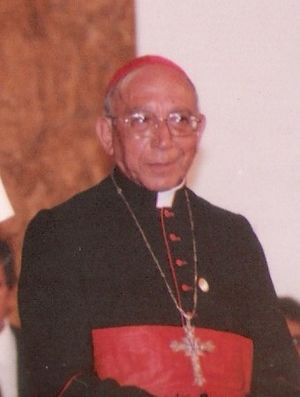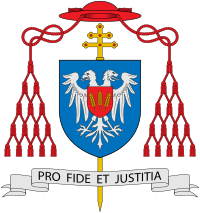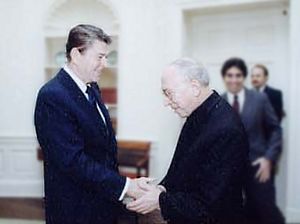Agostino Casaroli facts for kids
Quick facts for kids His Eminence Agostino Casaroli |
|
|---|---|
| Secretary of State | |

Agostino Casaroli in 1986
|
|
| See | Porto-Santa Rufina |
| Appointed | 1 July 1979 |
| Reign ended | 1 December 1990 |
| Predecessor | Jean-Marie Villot |
| Successor | Angelo Sodano |
| Other posts |
|
| Orders | |
| Ordination | 27 May 1937 |
| Consecration | 16 July 1967 by Pope Paul VI |
| Created Cardinal | 30 June 1979 |
| Rank | Cardinal-Bishop |
| Personal details | |
| Born | 24 November 1914 Castel San Giovanni, Italy |
| Died | 9 June 1998 (aged 83) Vatican City |
| Nationality | Italian |
| Denomination | Roman Catholic |
| Previous post |
|
| Motto | Pro fide et justitia |
| Coat of arms |  |
| Styles of Agostino Casaroli |
|
|---|---|
 |
|
| Reference style | His Eminence |
| Spoken style | Your Eminence |
| Informal style | Cardinal |
| See | Porto-Santa-Rufina (suburbicarian) |
Agostino Casaroli (born November 24, 1914 – died June 9, 1998) was an important Italian Catholic priest. He was a skilled diplomat for the Holy See (the Vatican). He became a Cardinal Secretary of State, a very high position in the Catholic Church. He played a key role in helping the Church deal with difficult situations in countries under Soviet rule after the Second Vatican Council.
Contents
Agostino Casaroli's Life Story
Casaroli was born in Castel San Giovanni, Italy. His family was quite ordinary; his father was a tailor. He studied at several schools, including the Collegio Alberoni in Piacenza. He also went to the Pontifical Lateran University in Rome. There, he earned a special degree in canon law, which is the law of the Church. He also studied at the Pontifical Ecclesiastical Academy, a school for Vatican diplomats.
Starting His Career
Casaroli became a priest on May 27, 1937. From 1937 to 1939, he continued his studies in Rome. In 1940, he began working in the Vatican's Secretariat of State. This is like the Vatican's foreign ministry. At the same time, he also helped with church duties in Rome.
He was given special titles by the Pope. On January 4, 1945, he became a "Privy Chamberlain of His Holiness." Later, on December 22, 1954, he was named a "Domestic Prelate of His Holiness." These titles showed his growing importance in the Church.
A Skilled Diplomat
Casaroli was known for being a very good diplomat. This means he was skilled at dealing with leaders from different countries. In 1955, he helped Cardinal Adeodato Giovanni Piazza at a big meeting of Latin American Bishops in Brazil.
From 1958 to 1961, he taught at the Pontifical Ecclesiastical Academy. In 1961, he became the Undersecretary for the Sacred Congregation for Extraordinary Ecclesiastical Affairs. This made him like a deputy foreign minister for the Vatican.
He represented the Holy See in important talks with countries like Tunisia in 1964. He also signed an agreement with Hungary in 1964. In 1965, he talked with the Communist government of Czechoslovakia. These talks were about appointing a new church leader in Prague.
On June 29, 1967, he became the Secretary of the Sacred Congregation for Extraordinary Ecclesiastical Affairs. Pope Paul VI made him a bishop on July 16, 1967.
After the Second Vatican Council, Casaroli became famous for his diplomatic skills. He could negotiate with governments that were not friendly to the Church. He led a conference in Helsinki from July 30 to August 1, 1975. On April 28, 1979, he was appointed Pro-Secretary of State.
Becoming a Cardinal
In 1979, Pope John Paul II made Casaroli a Cardinal-Priest. At the same time, he became the Cardinal Secretary of State. This is one of the most powerful jobs in the Vatican. Even though Casaroli was seen as less strict than other people close to the Pope, his amazing diplomatic skills were very important. Pope John Paul II needed his help in dealing with the Soviet Union.

In 1985, he became a Cardinal Bishop for the area of Porto-Santa-Rufina. In 1990, he retired from his role as Secretary of State. Angelo Sodano took over his position. From 1993 until his death in 1998, he was the Vice-Dean of the College of Cardinals. He passed away from heart and breathing problems.
His Views
Dealing with Communist Countries
Casaroli signed agreements with Hungary in 1964 and Yugoslavia in 1966. This was a new step for the Holy See, as it was the first time they had made such agreements with Communist governments. His personal writings, published later, showed that he did not like Communism. However, his excellent diplomatic skills made it seem like he had no strong feelings either way.
Honors
- He received an honorary degree from the University of Pavia in 1991.
See also
 In Spanish: Agostino Casaroli para niños
In Spanish: Agostino Casaroli para niños

